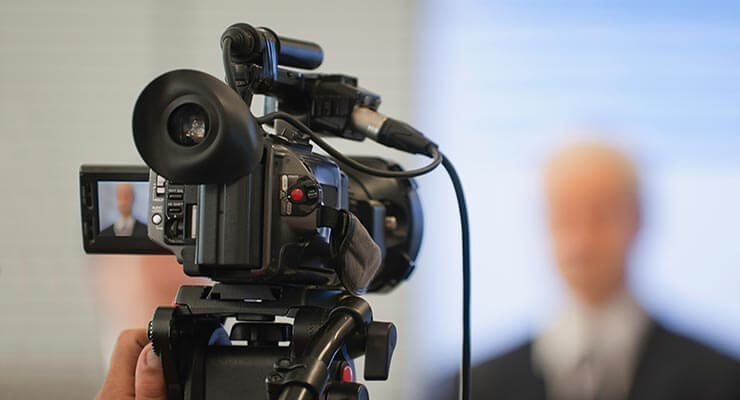High-Resolution Legal Videography for Accurate Evidence Recording.
The Duty of Legal Videography in Depositions and Trials
Legal videography has actually emerged as an essential tool in both depositions and trials, supplying a diverse approach to recording witness testimonies. As legal specialists progressively acknowledge its value, it triggers a much deeper evaluation of just how these visual records can affect juror perceptions and test outcomes.

Value of Lawful Videography
Legal videography plays an essential duty in the documentation and presentation of depositions and trials. This specialized area combines technical abilities with lawful expertise to create a trusted document of proceedings that can substantially affect instance outcomes. The appearance of lawful videography improves the understanding of witness testament, allowing jurors and courts to observe not just the talked words but likewise the demeanor, emotions, and body language of the witnesses.
On top of that, lawful videography gives an unbiased account of occasions, lessening the capacity for misconception that can accompany written transcripts alone. This visual documentation acts as a crucial device throughout trial presentations, facilitating a more clear and even more convincing narrative for both complainants and offenders. Moreover, the capability to replay video sectors during court procedures enables lawful groups to emphasize key factors, strengthening their arguments properly.
The relevance of legal videography expands past the court; it additionally plays an important function in preserving proof for future recommendation, whether for appeals or additional lawful action. Its integration right into the lawful process is essential for guaranteeing a reasonable and accurate depiction of the facts, eventually adding to the pursuit of justice.

Refine of Legal Videography
While capturing the nuances of depositions and trials, the process of lawful videography entails numerous crucial steps that make sure high-grade, accurate recordings. At first, a professional lawful videographer prepares by assessing the instance materials and understanding the specific needs of the deposition or test. This preparation consists of acquainting themselves with the individuals and the context, which aids in recording significant details.
On the day of the recording, the videographer establishes up the needed tools, which usually consists of high-definition video cameras, microphones, and proper lighting. Ensuring ideal angles and sound quality is essential, as it directly impacts the performance of the recording. The videographer connects with lawyers and participants to develop protocols, guaranteeing that everybody understands the recording process.
Throughout the deposition or trial, the videographer carefully records the proceedings, paying close attention to both spoken and non-verbal hints. This includes recording the temperament and responses of witnesses and attorneys. After the session ends, the videographer might edit the video footage for clearness and compliance with lawful requirements, producing an end product that properly shows the proceedings for future referral and usage in legal contexts.
Advantages in Depositions
The consolidation of videography in depositions offers many advantages that boost the general procedure of gathering proof. One main benefit is the capability to capture witness testaments with visual and acoustic fidelity, supplying an extra exact representation of the witness's demeanor, tone, and body movement. This multidimensional approach enables lawyers and juries to analyze integrity more properly than standard written records alone.
Furthermore, videographed depositions act as a powerful tool for maintaining testimony. Must a witness become unavailable for test, their videotaped deposition can be played in court, guaranteeing that their evidence remains obtainable and relevant. This element dramatically decreases the risk of shedding crucial information that could impact situation end results.

Lastly, videography enhances the total professionalism of the deposition process, instilling confidence in customers pertaining to the thoroughness of their legal depiction (legal videography). By leveraging modern technology, lawyers can substantially enhance the performance of depositions
Impact on Trials
In lots of trials, the assimilation of videography can substantially influence the presentation of proof and the jury's assumption. Legal videography captures witness testimonies and critical proof in a vibrant format, permitting jurors to involve with the material on numerous levels. This visual part improves the storytelling facet of a trial, providing context and psychological resonance that typical text-based proof might do not have.
Furthermore, video recordings can act image source as powerful devices for impeachment during interrogation. When inconsistencies arise between a witness's prior declarations and their courtroom testimony, video clip proof supplies an objective recommendation that can persuade jurors' point of views. This website here immediacy and clarity can bolster the credibility of a party's story while all at once undermining opposing debates.

Future Trends in Legal Videography
As we look towards the future of lawful videography, numerous arising patterns assure to improve its duty within the court room. One substantial fad is the assimilation of artificial knowledge (AI) in video clip evaluation and modifying. AI can enhance the procedure of recognizing key moments in videotaped depositions, permitting lawyers to swiftly access appropriate content, thereby boosting effectiveness in situation preparation.
Additionally, the surge of online reality (VR) and boosted truth (AR) innovations is expected to change just how jurors experience proof. legal videography. By immersing jurors in a substitute atmosphere, these technologies can give an extra profound understanding of intricate situations, resulting in even more informed considerations
Additionally, the increasing need for remote depositions, sped up by the COVID-19 pandemic, will likely proceed. Legal videographers will require to adapt to brand-new software and systems to make sure high-quality recordings in digital settings.
Last but not least, the growing focus on data protection will demand stricter methods for keeping and sharing video clip evidence. As the lawful landscape develops, lawful videographers must remain abreast of these trends to preserve their importance and effectiveness in the judicial additional reading procedure.
Conclusion
In recap, lawful videography offers an essential function in the judicial procedure, boosting the honesty of depositions and tests. As technology continues to develop, legal videography is positioned to more change its duty within the lawful landscape.